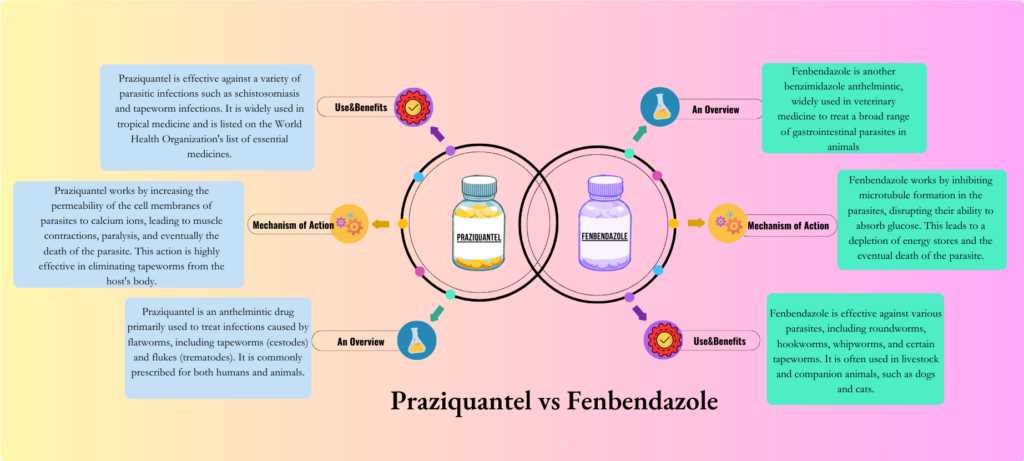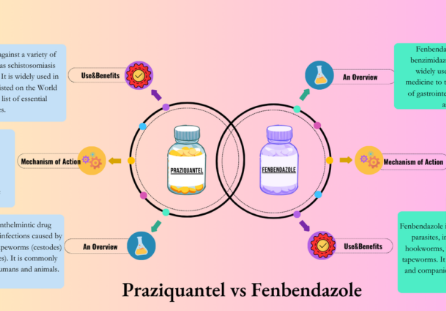Veterinary medicine uses two antiparasitic drugs to treat parasitic diseases: fenbendazole and Praziquantel. Both have distinct purposes and activities, even though they are both widely utilized. This page provides useful information on the applications, benefits, and differences between fenbendazole and Praziquantel for veterinarians and pet owners.
Praziquantel Information
Mostly used to treat diseases brought on by flatworms, such as tapeworms (cestodes) and flukes (trematodes), is the anthelmintic drug praziquantel. Animals and people alike are typically given it.
Utilization and Advantages
• The Human Condition: Just two parasitic diseases that Praziquantel successfully treats are tapworm and schistosomiasis. It has wide applicability in tropical medicine and is included in the World Health Organisation’s list of essential drugs.
• Veterinary medicine: Infections with animal tapeworms are treated with Praziquantel. Additional anthelmintics, including Pyrantel Pamoate, are sometimes included in a broad-spectrum deworming regimen.
The way it works: The parasite slowly dies from paralysis, muscle spasms, and increased permeability of its cell membranes to calcium ions brought on by Praziquantel. That makes it possible to get tapeworms out of their host’s body.

Fenbendazole Information
An alternative benzimidazole anthelmintic widely used in veterinary medicine to treat a range of gastrointestinal parasites in animals is fenbendazole.
Notations and Uses
In veterinary medicine, fenbendazole kills roundworms, hookworms, whipworms, and some tapeworms, among other parasites. Among the many domestic animals it finds wide use are dogs, cats, and cattle.
• Combination Therapy: Sometimes fenbendazole is used with other drugs like Pyrantel Pamoate to increase its efficacy against a wider range of parasites.
By stopping the parasites’ synthesis of microtubules, fenbendazole stops them from absorbing glucose. This uses up all of the parasite’s energy reserves, and it finally kills it.
Comparative analysis: comparing the area of involvement of fenbendazole with Praziquantel
Generally speaking, Praziquantel kills tapeworms and flukes. Both human and animal adult tapeworms respond remarkably effectively to it.
• Fenbendazole: Effectively treats gastrointestinal parasites, including nematodes and certain cestodes. Animals are its primary use, and its action range is wider than that of Praziquantel.
Clinical Performance and Indications
• Praziquantel: Clinical symptoms, such as weight loss and stomach pain, often pass away fast when this drug treats tapeworm infections. However, by laying fewer eggs, the parasites lessen the efficiency of the medication, according to examinations of the egg counts in the stool.
• Fenbendazole: It treats clinical conditions like weight loss, diarrhea, and poor coat condition in a similar manner. Reduction in the number of eggs in the feces is another crucial indicator of its efficacy; it shows a significant decrease in the parasite burden after treatment.
Solutions and Word of Caution
• Praziquantel: Usually well tolerated, its moderate side effects include nausea, lightheadedness, and stomach ache. Animals should not cause much harm and are considered harmless.
• Fenbendazole: Likewise well tolerated, vomiting and diarrhea are two of its minor side effects in some animals. It is believed to be safe for use on young and pregnant animals.
Animal Combination Therapies: Practical Uses
Using Pyrantel Pamoate and Praziquantel This combination makes simultaneous treatment of numerous parasite types possible. With regard to roundworms and hookworms, Pyrantel Pamoate works better than Praziquantel for tapeworms.
• Fenbendazole and Pyrantel Pamoate: These drugs used together can provide a thorough course of treatment when numerous parasite species are implicated.
Testing feces for eggs often has a big impact on how well deworming drugs work. This step is needed to assess how well fenbendazole and praziquantel work to treat parasite infestations. Emphasizing the need for this testing, veterinarians and pet owners are asked to participate actively in the health care of their animals.
Makeover
In the toolkit of veterinary medicine, fenbendazole and Praziquantel are invaluable parasite-control drugs. For infections with tapeworms and flukes, Praziquantel is recommended; fenbendazole works more broadly against other gastrointestinal parasites. Having knowledge of their unique functions, applications, and benefits, veterinarians and pet owners may make an informed decision about parasite control.
Praziquantel: Often used in conjunction with Pyrantel Pamoate, this wide-spectrum anti-tapeworm and anti-flu medication is utilized in human and animal treatment.
Large-spectrum nematodes with some cestode activity are mostly used in veterinary treatment and are safe for a wide range of animals, including young and pregnant ones. The effectiveness of these treatments mostly hinges on regular counts of feces eggs and careful clinical symptom assessment. These medicines will always be necessary to treat parasitic infections in humans and animals as long as the research is carried out.

References:
- “Clinical Efficacy of Praziquantel and Fenbendazole in Veterinary Medicine.” Journal of Veterinary Medicine. Retrieved from NCBI.
- “Combination Treatments in Parasitic Infections.” Veterinary Parasitology Journal. Retrieved from NCBI.
“Monitoring Parasitic Infections: Fecal Egg Count and Clinical Signs.” American Vet Med Assoc. Retrieved from NCBI.






